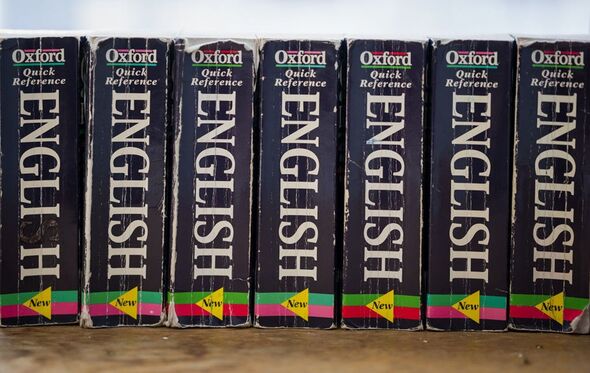New words including ‘wokery’ and ‘safe word’ added to Oxford English Dictionary | UK | News | Express.co.uk
Included in the update were disparaging nouns “wokery” and “wokeism,” signifying “progressive or leftwing attitudes or practices, especially those opposing social injustice or discrimination, that are viewed as doctrinaire, self-righteous, pernicious, or insincere.”
Link copied Bookmark
New words have been added to Oxford Dictionary (Image: Getty Images)
“Wokery”, “safe word”, “forever chemical” and “swear box” have been recently added to the Oxford English Dictionary (OED) in its latest update.
The OED undergoes quarterly updates to incorporate new words, meanings, and revisions, reflecting changes in language usage and introducing terms relevant to current events and trends.
The December 2023 update, disclosed on Thursday, encompasses new vocabulary related to technology, environmental pollutants, politics, literature, and sexuality.
Included in the update were disparaging nouns “wokery” and “wokeism,” signifying “progressive or leftwing attitudes or practices, especially those opposing social injustice or discrimination, that are viewed as doctrinaire, self-righteous, pernicious, or insincere.”
Another definition of “wokery,” referring to a restaurant, food counter, or kitchen serving dishes using a wok, was also incorporated.
The political term “chumocracy” made its debut, defined as a culture characterized or dominated by “influential networks of close friends,” commonly used to describe British politics.
The term “safe word” was added, denoting “a word or phrase chosen by participants in sexual activity (especially BDSM role play) as a mutually agreed signal to stop or pause.”
Several technology- and internet-related words, including “screen-share,” “generative artificial intelligence,” and “talkboard” (referring to an online forum or chat room), were introduced.
“Forever chemical” and “PFAS” made their way into the dictionary, describing synthetic compounds, such as those used in cookware for their non-stick properties, that do not break down in the environment.
Don’t miss… ‘I catered a wedding and the bride is refusing to pay as mum ordered wrong food’ [INSIGHT] Fish and chip shop customers in the UK ‘secretly being sold shark meat’ [REVEAL] Crisis for Spanish islands as tourists from European country ‘to stop visits’ [SPOTLIGHT]
Literary terms were also included, such as “Gradgrindian,” an adjective describing something characteristic of Thomas Gradgrind, the schoolmaster in Charles Dickens’s novel “Hard Times,” or something “hard and cold, solely concerned with facts; oppressively utilitarian.”
Another term, “Chekhov’s gun,” referencing a literary principle articulated by Anton Chekhov, suggests that unnecessary elements should not be introduced into a story.
In the realm of language evolution, the OED team added the suffixes “-splain” and “-splaining,” with examples like “straightsplaining,” “mumsplaining,” and “Biblesplain.”
Originating as a crowdsourcing initiative in the late 1800s, the OED commenced with a call for the submission of words and their meanings.
Seventy years elapsed, and in 1928, the initial version reached completion, comprising 414,825 entries.
Among the 3,000 volunteers who contributed words was Henry Spencer Ashbee, recognized for owning the world’s largest collection of pornography and erotica; he submitted words associated with genitals, pornography, and bondage.
Another notable contributor was Eleanor Marx, the daughter of Karl Marx.
Notable additions in the latest update include “taliswoman,” “Stephanian,” and “hypnic jerk.”
Latest videos
Would you like to receive news notifications from Daily Express?


